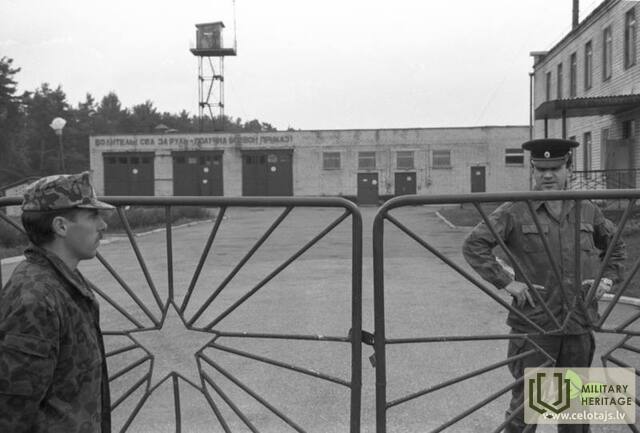About Kolka border guards
Kolka resident Baiba Šuvcāne talks about the times in Kolka when there were border guards there.
I was a child at the time and would visit my grandfather in the summer. I enjoyed it, especially since we were forbidden to swim. We could go to the seaside near the "Kristi" house, but as a child I had a misunderstanding, so what's the matter, the sea is here, but you can't go to the seaside and it's always that plowed beach. One such vivid childhood memory is when we were splashing in the water with a bunch of children, and we didn't even notice that we had drifted out of the permitted swimming area. Suddenly we see a horse galloping along the sea, with a border guard sitting on its back, along the seashore and galloping towards us at a huge gallop. I don't remember how it ended, I guess he was chased out. I was 10 years old. It seemed so funny, maybe he really didn't see the children playing there with his binoculars. I remember this event very vividly, it was the end of the 1950s.
The second thing that sticks in my memory is that as an immigrant, my grandfather and grandmother sent certificates to Riga for entry, the village confirmed that there were no objections and then I could enter. But I had already gone through all sorts of things with those permits, suddenly I needed to travel, but there was no permit and I was taking a risk. Because in order to get the permit, I had to wait at least 10 days. I took a risk and drove, because I knew where the border guards were on duty, then I got off the bus before that place, and either someone from Kolka rode towards me on horseback or I walked the rest of the way on foot along forest paths. In the 1980s, it was much easier, because permits were already given to relatives for a year. But in the 1960s-70s, they were only given for three months.
If someone was caught without permission, then while they were determining the person's identity, the zastava (post) made them peel potatoes. Similarly, if children went to Kolkasrags on their way and caught them, they had to peel potatoes. It's true that every forbidden thing is interesting, especially for young people.
I remember that I first went to the Kolka Cape Lighthouse in the mid-1950s, because my grandfather was a fisherman and used to drive his own motorboats during the Fishermen's Festival. Starting in the 1970s, entry into Kolka during the Fishermen's Festival was allowed to everyone, of course, you had to have a passport with you. Today, the Fishermen's Festival is not even half of what it used to be, because then everything that was produced in Kolka was shown, as well as various competitions related to the work of fishermen: mending nets, fish packer and fish-sighting competitions. Border guards and sailors also came to the Fishermen's Festival. There were fights, what can you do, vodka in your head and name-calling. But it also happened that the locals themselves would start fights and the border guards would go to break it up, and everything went wrong. The border guards themselves rarely started fights, because after that they were not allowed into the village for a long time, not even into the store, because discipline was strict.
The school had very close cooperation with the border guards. The school had a group of young border guards. The border guards organized all kinds of games and training for the students.
I also never understood why Lielirbe and Lūžnia are the places that have those big army bases inside. That was my ignorance, because those are the places where, if they put up their puff cannons, they shoot towards Saaremaa and from there towards Cape Serves again, so that the strait is completely controlled and no one can get through.
From my childhood (mid-1950s) I remember an incident when we were swimming on Kolka beach as children. At that time, there were only certain places in Kolka where you could do it. We – as children, fascinated, probably did not notice that we had strayed from the “official” swimming area. Suddenly we saw a rider – a border guard on a horse, galloping through the water to chase us out of the sea. We were all very scared at that time. At that time, there were very strange feelings – as if we lived right on the seashore, but to go to the beach, we had to go to certain places – further away. You were not allowed to go over the dunes. Even within the village borders, the beach was trodden on horseback to see the tracks of “trespassers”. I recently found a photo of my mother from 1952. Only with today's view did I see the plowed beach behind my mother, and on the horizon of the sea – a warship. At that time, we were used to such things. We all had permits. They were checked at Mērsrags (rarely), before Roja and Kolka, where border guard huts with a “barrier” had been built. In the eighties, there were fewer checks. There was a border guard post (zastava) in Kolka. We got along well with the border guards. The soldiers serving there were often let out to movie screenings. There was one fight during a ball, but it was involving soldiers from the naval forces who had served at Kolkasrags itself.
The border guards left their duty stations very solidly, without destroying anything, without conflicts, culturally, the garbage was collected. But then the locals...





